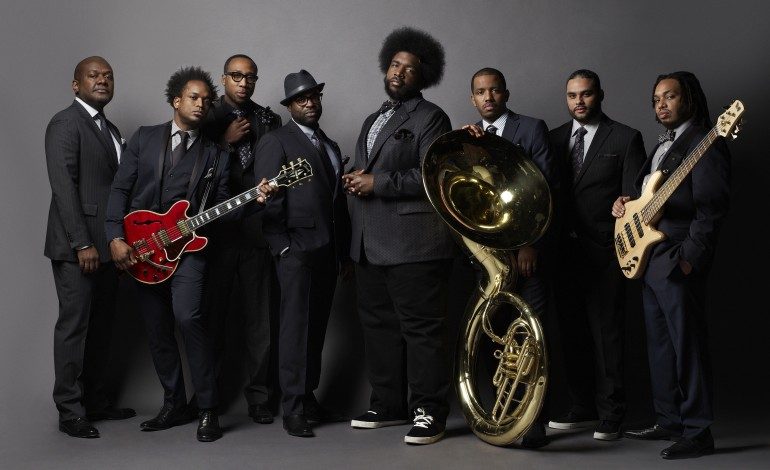

…and then you shoot your cousin is the prolific Roots’ eleventh album, coming quick on the heels of their 2013 collaboration with Elvis Costello, Wise Up Ghost, and their 2011 Grammy-winning album, Undun. Despite the short time between these releases, The Roots somehow manage to maintain the high bar they set for themselves with the thoughtful and thought-provoking cousin.
Though categorized as hip-hop, The Roots as always defy categorization and weave jazz, soul and instrumental abstraction into a seamless experience. At thirty-three minutes, cousin is a short tour through the characters met in modern hip-hop — the successes who have lost touch with themselves, the strivers who never make it, the wannabes who never could — as they struggle with the mainly materialistic and arguably hollow values that have overtaken the genre. Overall, the album is bleak, seething with loneliness, despair,and a sense of inevitability impossible to overcome. To further express these themes, Questlove teamed up with Vulture to publish a six-part essay publishinh, which is worth the read.
To introduce the album, The Roots staged a collaborative performance at the Public Theater in New York, featuring guests from the album and others for an integrated experience more striking than any listening party. The stage is at the center of the room, and the audience rises up around the performers. Above center stage hangs a chandelier of nooses, empty, waiting. The tone is set. Questlove is at the rear of the stage, on a riser above with his turntable and drums. From this position he spins the new album’s tracks in a fresh sequence. His seems to orchestrate the scene, choosing whom we meet, when and adjusting the tone and tension of the room. Beneath him, sampling artist Jeremy Ellis reworks sounds in real time — including a dextrous reworking of James Brown’s “I Got the Feelin’” — and the Metropolis Ensemble, a string quartet featured on the album, reprise and expand on their work created for the album. The strings are the main means of communicating the build-up and emotional frenzy through shrieking dissonance as characters find themselves at odds with their world.
The foreground space is left open for a mix of performances. To begin the evening, several hundred balloon animals drop into the space, creating a blanket of color and movement (and the occasional *pop*pop* as they burst) as the artists move through them. Black Thought emerges throughout the evening to recite verse unaccompanied, each piece providing the context for the next segment of songs. Early on, beatboxer Rahzel improvs with Craig S. Harris on trombone and a didgeridoo-type instrument. Storyboard P, a movement artist whose performance places him somewhere between breakdancer and mime, enters joyously, diving through the balloons, elated at the experience. Later in the evening, his character returns broken, set to fight all that surrounds him.
The album ends with the sonic hug that is “Tomorrow,” featuring Raheem DeVaughn on vocals. In an effort to restore hope to the hopeless, DeVaughn convincingly reminds the listener to be true to herself. This simple advice is the best means of survival. But the performance has an epilogue: Captain Kirk appears to play a groove-laden instrumental cover of Hendrix’s “Little Wing.” With only Kirk’s guitar over arpeggios to carry it, the song was both powerful and in sync with the mood of the evening — somber, with an ounce of hope. The nooses are above, but empty.
…and then you shoot your cousin tracklist
1. Theme from the Middle of the Night (Nina Simone)
2. Never ft. Patty Crash
3. When the People Cheer ft. Modesty Lycan
4. The Devil
5. Black Rock ft. Dice Raw
6. Understand ft. Dice Raw and Greg Porn
7. Dies Irae (Michel Chion)
8. The Coming ft. Mercedes Martinez
9. The Dark (Trinity) ft. Dice Raw and Greg Porn
10. The Unraveling ft. Raheem DeVaughn
11. Tomorrow ft. Raheem DeVaughn






